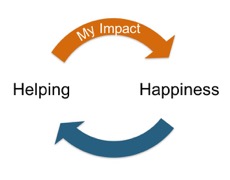The Hidden Benefits of Showing Impact
The perception that your donation is going to make a difference i.e. your perceived impact is another key driver of giving. That’s why it’s going to be featured prominently in our Behavioral Science Symposium this coming Monday and Tuesday. Several talks will show you how you could use impact information and how you could increase your supporters’ perceived impact to increase giving.
Today, I’d like to post about a completely different benefit that comes from sharing fundraising impact, actually two: an increase in the supporter’s wellbeing and life expectancy! Sounds extreme? Let’s dig into the evidence.
The idea that helping others can increase our own happiness isn’t new. It’s as old as Aristotle himself; he thought that individual happiness stems from the performance of our moral duties. This notion is still alive today and with data to support it. A group of people that was instructed to spend an amount of money (either $5 or $20) on someone else reported happier moods later that day than a group of people that was told to spend the money on themselves.[Interesting fact: when asked, people say that spending money on themselves would make them happier – our everyday choices are guided by this flawed intuition].
Is the donor’s happiness important? Yes, for obvious reasons. But also yes, for a less obvious, less known reason.

Happier people give more.
A positive feedback loop exists between helping others and happiness. The happier I am, the more likely I am to help/give, and helping/giving has a positive impact on my happiness.
And impact is a significant driver of that happiness.
The knowledge that your action, or donation, has made a difference is what transforms the initial feeling of “warm glow” into happiness.
Here’s a study showing exactly that. As people were coming in, the researchers measured their happiness level (baseline), and asked them if they’d like to make a donation in one of two ways:
UNICEF general: “Before you make a decision about donating though, you should know that your donation will be given to the United Nations International Children’s Emergency Fund (UNICEF), which is a charitable foundation whose work is carried out in 190 countries around the world. The heart of UNICEF’s work is in the field with some 10,000 employees working on international priorities such as child protection, survival and development.”
Spread the Net: “Before you make a decision about donating though, you should know that your donation will be given to Spread the Net, a subsidiary branch of the United Nations International Children’s Emergency Fund (UNICEF). This cause was initiated to raise awareness and help wipe out death by malaria. Every $10 collected purchases a bed net for a child in Africa – a simple, effective, inexpensive way to make a BIG difference – saving lives, one net at a time.”
After the decision to donate, the experimenters asked participants how much impact they felt they could have and measured their happiness levels again. Here’s what they found:
- Impact information didn’t affect donations (join our Symposium for evidence to the contrary)
- People felt they have more impact in the Spread the Net condition than in the Unicef condition.
- Donors experienced higher happiness, but only when donations were given to Spread the Net, the charity that described how the donation would be used.
As the authors put it: “Remarkably, we found that people who donated more money to one of the world’s best known charities, UNICEF, failed to reap any emotional benefits from their generosity. Yet, people who donated more money to an affiliated charity (SPN) that highlights perceived impact did report greater happiness. These findings underscore the potential real-world importance of maximizing prosocial impact.”
Want to trigger the positive feedback loop between giving and happiness? Emphasize the impact the donation could have and make your supporters happier.
As a bonus, you might even prolong their life (and thus, giving!). For a while now, a positive outlook in life has been associated with better health and lower mortality. But now, there’s specific evidence showing that charitable giving reduces stress and strengthens the immune system leading to better health and longer life.
Whether impact information affects donations in the moment or not, there will be a longer term pay off by its presence. Supporters will feel happier, live longer and give more. A win-win situation for both you and them.
Kiki



Great article – thank you. It really is so important to show exactly what donors’ dollars were able to do.